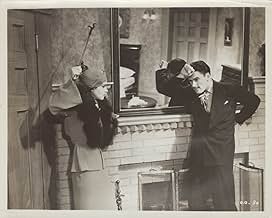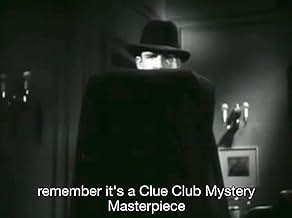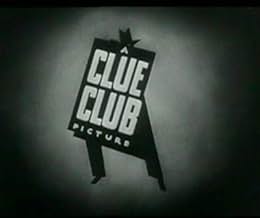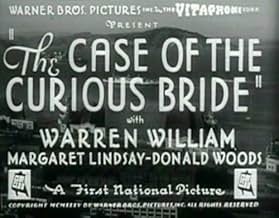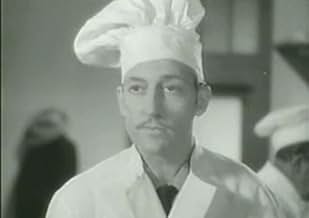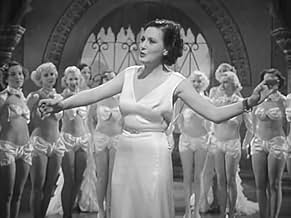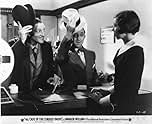IMDb RATING
6.6/10
1.3K
YOUR RATING
Perry interrupts his vacation plans when an ex-girlfriend, now newly married, asks him to help her with murder and bigamy charges.Perry interrupts his vacation plans when an ex-girlfriend, now newly married, asks him to help her with murder and bigamy charges.Perry interrupts his vacation plans when an ex-girlfriend, now newly married, asks him to help her with murder and bigamy charges.
Wini Shaw
- Doris Pender
- (as Winifred Shaw)
Thomas E. Jackson
- Toots Howard
- (as Thomas Jackson)
Featured reviews
... since the premise of the crime does not make sense, and the behavior of both Perry (William) and the DA are outright illegal and unethical. (Sometimes one is not necessarily the other).
Rhoda Montagne (Margaret Lindsay), recently married to the wealthy Carl Montagne (Donald Woods), is allegedly "curious" if a particular person is alive. Except she isn't curious when she calls Perry and does the obvious old "a friend of mine wants to know" routine. Her allegedly dead husband has returned from the grave and has been bothering her for lots of money or he threatens the scandal of bigamy. Now this guy's racket makes no sense. He marries women, fakes his own death, and waits for them to marry rich men and then pulls the bigamy routine? How does he know, during the Great Depression, that any of them will marry a rich guy? This is a scam that might never pay off.
Well Rhoda's not dead husband turns up dead again - this time for real - stabbed in his apartment. Rhoda is arrested for the crime. But even her arrest is full of hijinks. Perry first hides the suspect then turns her over to be "arrested by the press", who then don't have to turn her over until they finish their interview? The police and DA work to hide Rhoda from her attorney, Perry, in spite of a habeas corpus order UNTIL they get a confession. Law & Order prosecutor Jack McCoy would shake his head and knock all of their heads together Three Stooges style.
And yet it works. Because the mystery of who actually did do it is a pretty good yarn. Because Warren William as the always suave never mussed never plussed attorney moves gracefully through his paces. Because Allan Jenkins as Perry's ever loyal muscle is a not very bright yet humorous delight. And because of the coroner who loves his work - "I'll be seeing you" - is always his greeting to everybody.
A couple of surprises - Margaret Lindsay and Donald Woods were paired several times because they had some chemistry together. But this time the wooden Donald Woods uses his stiffness to surprise you with the outcome. Also, speaking of stiffs, Errol Flynn is mute in a bit part as the murdered man. Did director Michael Curtiz, who directed Flynn in a total of twelve films, look under the sheet and say "kid, you've got something"?.
Rhoda Montagne (Margaret Lindsay), recently married to the wealthy Carl Montagne (Donald Woods), is allegedly "curious" if a particular person is alive. Except she isn't curious when she calls Perry and does the obvious old "a friend of mine wants to know" routine. Her allegedly dead husband has returned from the grave and has been bothering her for lots of money or he threatens the scandal of bigamy. Now this guy's racket makes no sense. He marries women, fakes his own death, and waits for them to marry rich men and then pulls the bigamy routine? How does he know, during the Great Depression, that any of them will marry a rich guy? This is a scam that might never pay off.
Well Rhoda's not dead husband turns up dead again - this time for real - stabbed in his apartment. Rhoda is arrested for the crime. But even her arrest is full of hijinks. Perry first hides the suspect then turns her over to be "arrested by the press", who then don't have to turn her over until they finish their interview? The police and DA work to hide Rhoda from her attorney, Perry, in spite of a habeas corpus order UNTIL they get a confession. Law & Order prosecutor Jack McCoy would shake his head and knock all of their heads together Three Stooges style.
And yet it works. Because the mystery of who actually did do it is a pretty good yarn. Because Warren William as the always suave never mussed never plussed attorney moves gracefully through his paces. Because Allan Jenkins as Perry's ever loyal muscle is a not very bright yet humorous delight. And because of the coroner who loves his work - "I'll be seeing you" - is always his greeting to everybody.
A couple of surprises - Margaret Lindsay and Donald Woods were paired several times because they had some chemistry together. But this time the wooden Donald Woods uses his stiffness to surprise you with the outcome. Also, speaking of stiffs, Errol Flynn is mute in a bit part as the murdered man. Did director Michael Curtiz, who directed Flynn in a total of twelve films, look under the sheet and say "kid, you've got something"?.
Second in the Perry Mason film series starring Warren William as the famed lawyer/detective. It's arguably the best in the series. This time around Perry is asked for help by an old flame and winds up investigating her estranged husband's murder. Fun entry with a weird thread involving Perry's cooking hobby. William is having fun as he usually seemed to be. Allen Jenkins is a hoot as Perry's sidekick. Claire Dodd is an enjoyable Della Street. Errol Flynn has a "blink and you'll miss him" appearance in a flashback. This was his inauspicious feature film debut. One of Humphrey Bogart's wives, Mayo Methot, has a small part. The rest of the fine cast includes the always lovely Margaret Lindsay, the always bland Donald Woods, and the always grumpy Barton MacLane. It's a good-looking film, attractively photographed by David Abel with nice direction from the great Michael Curtiz, who would go on to much bigger and better films, including many starring Flynn.
Margaret Lindsay approaches Warren William to ask him a question for a friend. It's always for a friend, isn't it? She's about to be married and wants to make sure her first husband is dead. While William goes in search of a bottle of Chablis '21, Miss Lindsay disappears. When the coffin of her first husband is opened, it contains a wooden Indian.
The second Perry Mason movie has him in San Francisco, still a sharp, urbane, sophisticated man, and a bit of a shyster when it comes to defending his clients. It's a nicely tangled little mystery under the direction of Michael Curtiz, with the snap and crackling pace that had become a standard for Warners programmers during the pre-code era, and which had not quite vanished.
The second Perry Mason movie has him in San Francisco, still a sharp, urbane, sophisticated man, and a bit of a shyster when it comes to defending his clients. It's a nicely tangled little mystery under the direction of Michael Curtiz, with the snap and crackling pace that had become a standard for Warners programmers during the pre-code era, and which had not quite vanished.
Of all the "Perry Mason" films of the 1930's (there were six films, produced from 1934 to 1937), this one has to be the best. -- At least, it's MY favorite.
Warren William, who played Mason in more of these films than anyone else, elevates this short murder mystery from programmer to an 'almost-A' feature.
Claire Dodd, as Della Street, is little more than window dressing, as were all of the "Della's" in these early Warners' Perry Mason films. Allen Jenkins gives one of his standard (but good) blustery performances as Mason's side-kick, Paul Drake (called "Spuds" Drake in this film, and a complete opposite of TV's dapper Paul Drake, played by William Hopper). The best supporting role was that of Olin Howard as the coroner, who is also Perry's good buddy, and frequent dining partner. The veteran character actress, Margaret Lindsay is the "Curious Bride" of the title.
The real surprise (the first time I saw this) was seeing Errol Flynn doing a "bit" part in a flashback sequence at the end of the film. Flynn has a non-speaking part as Margaret Lindsay's first husband. This flashback scene is narrated by the Curious Bride's current husband, played by Donald Woods (who would later play Perry Mason in another of these Warner Brothers efforts, though not anywhere as entertainingly as Warren William).
The use of soft-focus fades for every scene change, at first seems to help move the story, but can also be a bit irritating.-- Overall though, this is a well photographed film, --both the nicely composed interiors, and the outdoor urban location shots of 1935 San Francisco (although the Mason stories are mostly based in L.A.).
Directed by Michael Curtiz, this swift-moving murder mystery has the feel of many of Curtiz's bigger-budgeted Warner films, and is easily the best of the Mason series. At the same time, it is not too unlike the other 5 Mason films that Warners produced.
Unfortunately, Warren William could not play Mason in all of these films, but overlooking that fact, all six of the Warners "Perry Mason" films, including "The Case of the Stuttering Bishop", "The Case of the Velvet Claws," and "The Case of the Lucky Legs" are very faithful to the source material, and all are entertainingly done.
By the way-- because all of these films were adapted from original Earl Stanley Gardner stories, all of these titles showed up in the 1950's, produced as episodes in Raymond Burr's "Perry Mason" TV series. It's very interesting to see the different treatment these stories were given on TV.
--D.--
Warren William, who played Mason in more of these films than anyone else, elevates this short murder mystery from programmer to an 'almost-A' feature.
Claire Dodd, as Della Street, is little more than window dressing, as were all of the "Della's" in these early Warners' Perry Mason films. Allen Jenkins gives one of his standard (but good) blustery performances as Mason's side-kick, Paul Drake (called "Spuds" Drake in this film, and a complete opposite of TV's dapper Paul Drake, played by William Hopper). The best supporting role was that of Olin Howard as the coroner, who is also Perry's good buddy, and frequent dining partner. The veteran character actress, Margaret Lindsay is the "Curious Bride" of the title.
The real surprise (the first time I saw this) was seeing Errol Flynn doing a "bit" part in a flashback sequence at the end of the film. Flynn has a non-speaking part as Margaret Lindsay's first husband. This flashback scene is narrated by the Curious Bride's current husband, played by Donald Woods (who would later play Perry Mason in another of these Warner Brothers efforts, though not anywhere as entertainingly as Warren William).
The use of soft-focus fades for every scene change, at first seems to help move the story, but can also be a bit irritating.-- Overall though, this is a well photographed film, --both the nicely composed interiors, and the outdoor urban location shots of 1935 San Francisco (although the Mason stories are mostly based in L.A.).
Directed by Michael Curtiz, this swift-moving murder mystery has the feel of many of Curtiz's bigger-budgeted Warner films, and is easily the best of the Mason series. At the same time, it is not too unlike the other 5 Mason films that Warners produced.
Unfortunately, Warren William could not play Mason in all of these films, but overlooking that fact, all six of the Warners "Perry Mason" films, including "The Case of the Stuttering Bishop", "The Case of the Velvet Claws," and "The Case of the Lucky Legs" are very faithful to the source material, and all are entertainingly done.
By the way-- because all of these films were adapted from original Earl Stanley Gardner stories, all of these titles showed up in the 1950's, produced as episodes in Raymond Burr's "Perry Mason" TV series. It's very interesting to see the different treatment these stories were given on TV.
--D.--
"The Case of the Curious Bride" is one of the Perry Mason films of the 1930s that starred Warren William as Perry. Erle Stanley Gardner hated these films with a passion. His 1930s Perry in the books was a passionate young man given to intense speeches. He mellowed later on, of course, and it was Gardner himself who saw Burr at the audition for Hamilton Burger and said, "That's Perry Mason." (The original star of the series was supposed to be Fred MacMurray.) So it's easy to see why Gardner despised everything about this particular Mason incarnation.
Regardless of how Gardner felt, this film is a lot of fun, thanks to a breezy performance by Warren William, who flirts shamelessly with every woman who crosses his path and fools the DA time and time again. The dialogue is fast and witty, and Curtiz keeps the action going at a breakneck speed. Allan Jenkins is Paul Drake like you've never seen him - Perry calls him Spudsy -- and Della is the beautiful Clare Dodd. Margaret Lindsay is the woman Perry is defending, who comes to him with a marital problem, i.e., the husband she thought was dead is alive - at first. Later, he winds up dead, in the person of...Errol Flynn in his first American appearance - and his wife is accused. Flynn doesn't have much to do except appear in flashback. For some reason, instead of Los Angeles, the story is set in San Francisco - more atmosphere, perhaps.
William seems to have had the same approach to this character as he had for Philo Vance and the Sam Spade character he played in Satan Met a Lady, but he's so delightful, it doesn't matter. He always looks like he's having a blast, and the audience does too. Hard to believe that until he hit B movies in the mid-'30s, he generally played heavies, but he did, and played them well. When his leading man days were over, he continued in character roles until his death in 1948. How great that we can see his talent now on Turner Classic Movies.
This film is a great reminder that during the Depression, Hollywood gave audiences films that to enjoy and watch to forget their troubles for awhile. I'm not in the Depression per se; I'm just depressed, but "The Case of the Curious Bride" put a smile on my face. It will yours, too.
Regardless of how Gardner felt, this film is a lot of fun, thanks to a breezy performance by Warren William, who flirts shamelessly with every woman who crosses his path and fools the DA time and time again. The dialogue is fast and witty, and Curtiz keeps the action going at a breakneck speed. Allan Jenkins is Paul Drake like you've never seen him - Perry calls him Spudsy -- and Della is the beautiful Clare Dodd. Margaret Lindsay is the woman Perry is defending, who comes to him with a marital problem, i.e., the husband she thought was dead is alive - at first. Later, he winds up dead, in the person of...Errol Flynn in his first American appearance - and his wife is accused. Flynn doesn't have much to do except appear in flashback. For some reason, instead of Los Angeles, the story is set in San Francisco - more atmosphere, perhaps.
William seems to have had the same approach to this character as he had for Philo Vance and the Sam Spade character he played in Satan Met a Lady, but he's so delightful, it doesn't matter. He always looks like he's having a blast, and the audience does too. Hard to believe that until he hit B movies in the mid-'30s, he generally played heavies, but he did, and played them well. When his leading man days were over, he continued in character roles until his death in 1948. How great that we can see his talent now on Turner Classic Movies.
This film is a great reminder that during the Depression, Hollywood gave audiences films that to enjoy and watch to forget their troubles for awhile. I'm not in the Depression per se; I'm just depressed, but "The Case of the Curious Bride" put a smile on my face. It will yours, too.
Did you know
- TriviaAlthough this entry in the series was critically well-received, author Erle Stanley Gardner reportedly hated it as did many of the readers of the Mason novel. Gardner repeatedly offered his services to Warner Bros. as consultant for the screen adaptation, but, in his words, "I have been continually snubbed."
- GoofsWhen Perry is picking out crabs at Fisherman's Wharf, he says, "Joe, we've decided upon these four antagonistic anthropods." Crabs are arthropods; there is no such thing as an anthropod.
- Quotes
[last lines]
Della Street: [to Perry] You're so wonderful. If only you couldn't cook.
- ConnectionsFeatured in The Adventures of Errol Flynn (2005)
- SoundtracksNeapolitan Nights
(1925) (uncredited)
Music by J.S. Zamecnik
First tune played at Luigi's restaurant
Played when Mason and Rhoda are talking at Luigi's
- How long is The Case of the Curious Bride?Powered by Alexa
Details
- Release date
- Country of origin
- Languages
- Also known as
- Clue Club #4: The Case of the Curious Bride
- Filming locations
- Production company
- See more company credits at IMDbPro
- Runtime1 hour 20 minutes
- Color
- Sound mix
- Aspect ratio
- 1.37 : 1
Contribute to this page
Suggest an edit or add missing content


